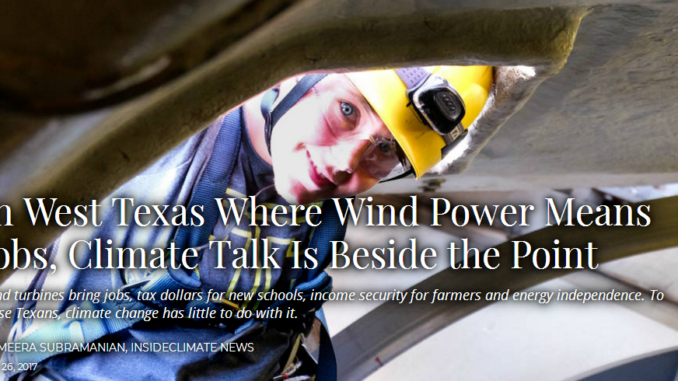
All along the straight-shot roads of Nolan County in West Texas, wind turbines soar over endless acres of farms, the landscape either heavy with cotton ready to harvest or flushed green with the start of winter wheat. The turbines rise from expanses of ranches, where black Angus beef cattle gaze placidly at the horizon. Here and there are abandoned farmhouses dating to the 1880s, when this land was first settled and water windmills were first erected. Occasionally a few pump jacks bob their metallic heads, vestiges of a once-booming oil industry still satiating an endless thirst.
Every industry creates an ecosystem around it. If the wind turbines that sprouted in West Texas were huge steel trees, spinning sleek carbon-fiber blades 100 feet in length, then the wind farms—including Roscoe Wind Project and Horse Hollow Wind Energy Center, some of the largest in the world—were their forest. Spread out across the expansive vista, invisible air currents feed the structures, their imperceptible roots extending out to the community that contains them.
“The wind industry has changed my life, and it’s changed it for the better,” James Beall told me as we stood at the base of one of those industrial versions of an old-growth tree, a 2 megawatt DeWind turbine that Texas State Technical College (TSTC) owns and uses to train its students to become wind energy technicians. While four of those students climbed 258 rungs of a vertical ladder to the nacelle, the streamlined mechanical housing at the top of the turbine, James and I awaited an elevator to take us up. From here on the ground, the nacelle, perched on its 300-foot column, looked tiny. It was actually the size of a bus.
As discussions around climate change in America have become partisan, so have those around kilowatts—but not here. There was money to be made, and these students—like the Texan Republicans in power over the last 20 years—weren’t going to miss out on the chance to make it.
James is 39 years old, with a strawberry blonde beard and a voice smooth from his upbringing in the Nolan County seat of Sweetwater, also home to the West Texas campus of TSTC. As we waited for the elevator, we talked about the danger of working in the oil and gas fields—an industry that his father had made him promise, when he was 18, never to work in. James’ father, a Vietnam vet, had worked in the oil fields when James was a boy, before finally getting disability pay for post-traumatic stress disorder, or PTSD, which dated back to his time in Vietnam when he’d been sent in to clean up the massacre of Hamburger Hill, James told me. But while Vietnam had broken James’s father’s mind, it was the oil fields that were the greater hazard for his body. It was there where he had broken his back and later his leg. It was the reason he had extracted the pledge from his son never to work in the industry—a tall order for a young man in Sweetwater, with few other opportunities.
Visits: 4


Be the first to comment